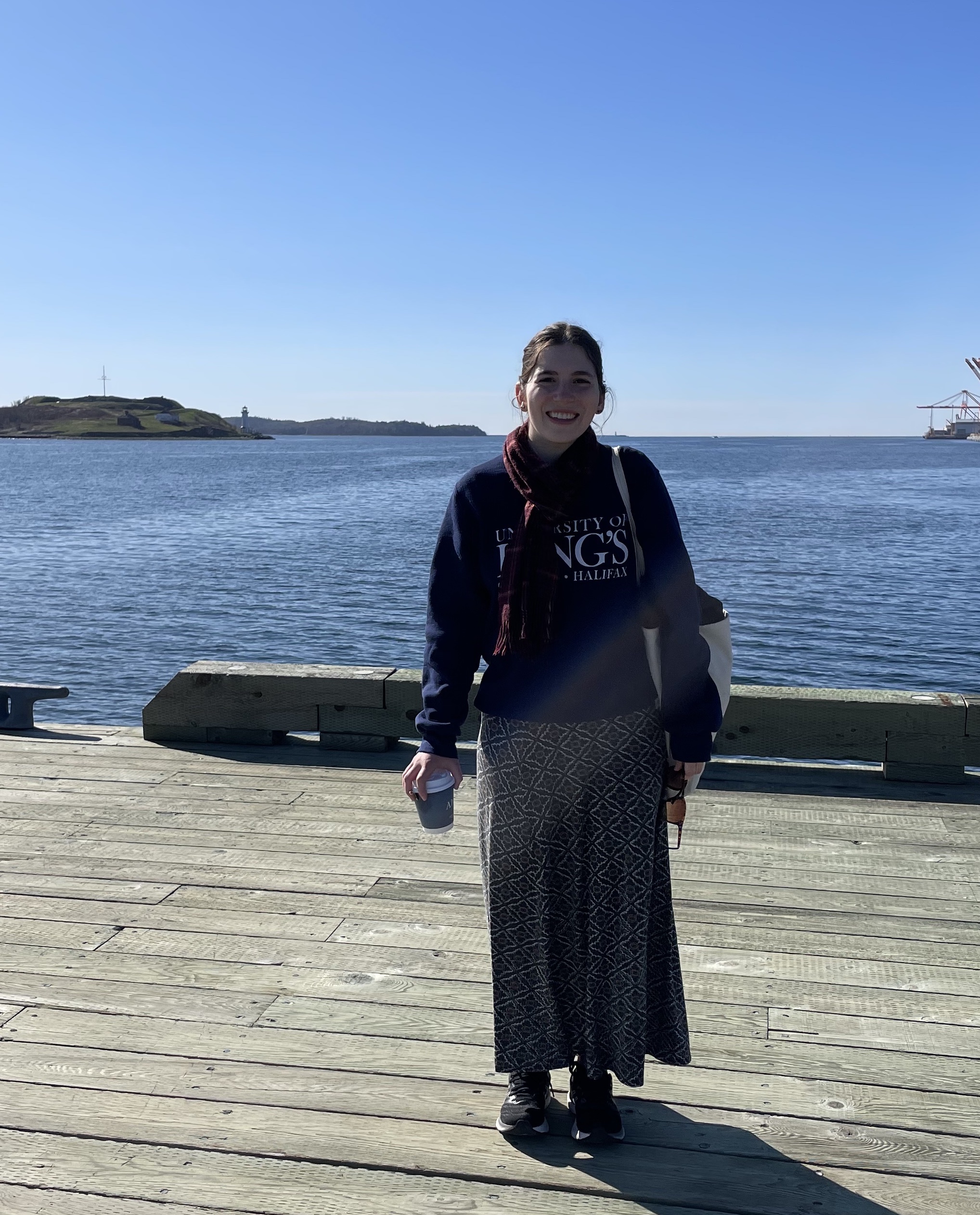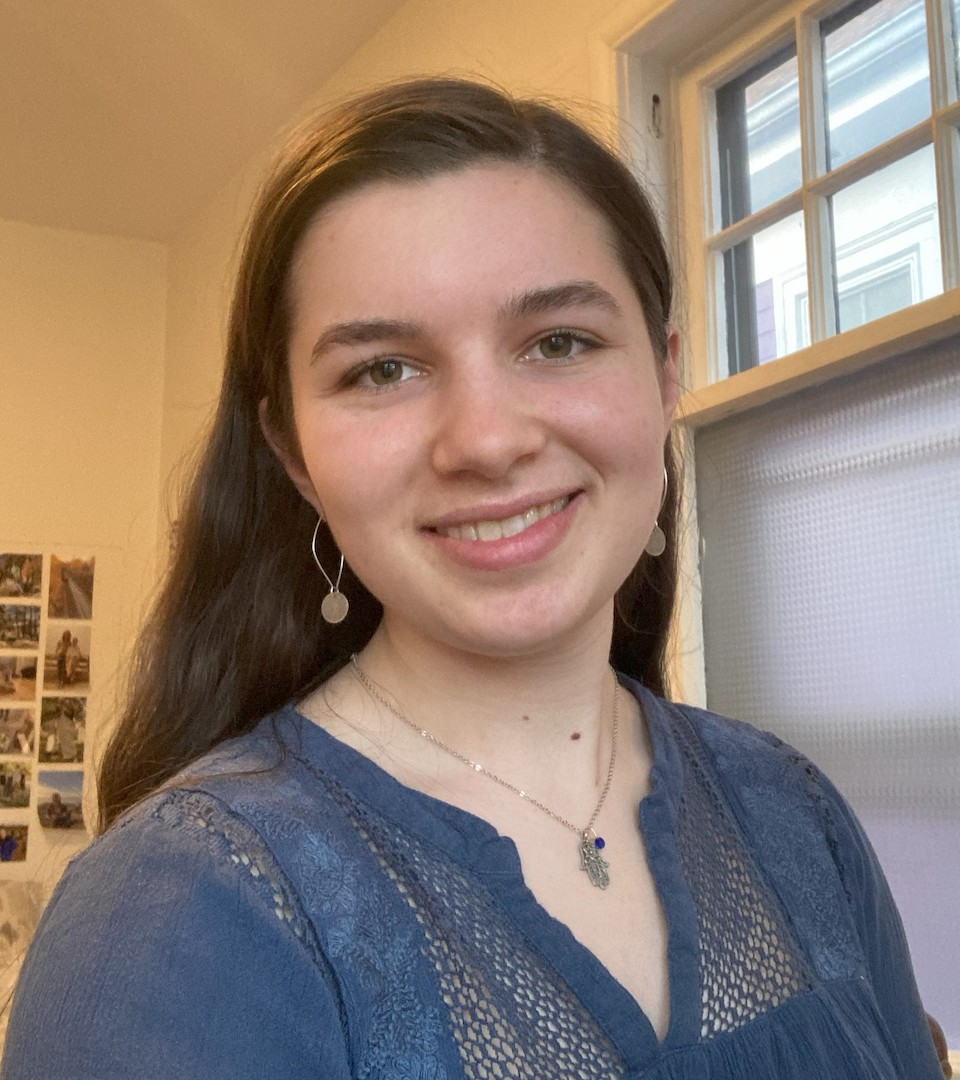Megan Emanuele
 Year after year, students come to King’s for the Foundation Year Program (FYP), eager to study the classics and read “the great books” as the point of entry to their university education. Though not always: Megan Emanuele, has a different take.
Year after year, students come to King’s for the Foundation Year Program (FYP), eager to study the classics and read “the great books” as the point of entry to their university education. Though not always: Megan Emanuele, has a different take.
“I was looking for something interesting.” She adds, “King’s had all the strangest courses I had ever seen.”
Emanuele, a History of Science and Technology (HOST) and religious studies major was drawn to classes like Dr. Kyle Fraser’s HOST courses Beginning of Wisdom and Magic, Science and the Occult. It was, perhaps, the greatest mysteries of all that drew her to King’s.
For Emanuele, there’s a convergence between her two majors. “For me, HOST was about the history of knowledge, of how we came to know things in the broadest sense, not just science. When we go back far enough, science and religion blend together.” Her honours thesis was on Max Weber’s theory of disenchantment. Emanuele explains in the original German, Weber’s theory translates to “demagicification.” She adds, “This is not a real word, but it is what I’ve come across scholars using.”
“[Weber] writes about the replacement of religion with science and how it’s basically taken all the magic from the world. As we became hyper rationalized, there was no room for mystery or mythology. Weber had a deep interest in Christian mysticism.”
Emanuele’s search for that magic led her to focus on Buddhism and Hinduism within religious studies and, in her final year, to make a home for herself within the community of the King’s Chapel. “I will miss so much about King’s. I’ll miss my professors, Dr. Fraser and Dr. [Stephen] Snobelen among them. I’ll miss the library and the Chapel. I really only discovered the people at the Chapel this year and I wish I’d gotten to know them sooner. I loved being a part of a group that was centered around faith. There was just such an openness and kindness that was implicit in the community.”
Next year will find Emanuele home, in Orillia, Ont. “I need some time to figure out what’s next,” she says. She’ll continue to work on her diploma in herbalism, an interest that’s grown from a family love of gardening. “I may apply to graduate school in religious studies. And there’s a program at the University of Amsterdam on esotericism that looks fascinating. I’m curious by nature, the stranger the better,” she laughs, making light of her rich fascination with the mystical.
Sadie Quinn
 It’s not uncommon to have wide-ranging, varied interests, but it’s rare to seamlessly bring them all together. Sadie Quinn, who graduates this spring with Combined Honours in History of Science and Technology (HOST) and theatre studies, has done exactly that during her four years at King’s. “Any time I’ve had an opportunity to connect the two very different sides of my degree, the history of science and the theatre, I’ve done so,” she affirms. That includes writing a science-focused play for her playwriting course and directing a production of Michael Frayn’s Copenhagen for the King’s Theatrical Society (KTS). Copenhagen, set in the aftermath of the Second World War, focuses on two physicists arguing about nuclear power.
It’s not uncommon to have wide-ranging, varied interests, but it’s rare to seamlessly bring them all together. Sadie Quinn, who graduates this spring with Combined Honours in History of Science and Technology (HOST) and theatre studies, has done exactly that during her four years at King’s. “Any time I’ve had an opportunity to connect the two very different sides of my degree, the history of science and the theatre, I’ve done so,” she affirms. That includes writing a science-focused play for her playwriting course and directing a production of Michael Frayn’s Copenhagen for the King’s Theatrical Society (KTS). Copenhagen, set in the aftermath of the Second World War, focuses on two physicists arguing about nuclear power.
“I first read Copenhagen in my Introduction to the History of Science class and fell in love with it,” she explains. “Our production will live for me as one of my best memories of King’s. It was my first full-length play—and it’s not an easy play.”
Easy doesn’t seem to interest Quinn; she also directed Tom Stoppard’s Arcadia for KTS, an ambitious undertaking even for a professional company, and Aristophanes’ The Birds for Classics in the Quad.
Environmental issues have always been a driving force; Quinn got involved in environmental activism in high school in Vancouver and brought her passion to Halifax where she helped organize youth climate strikes and demonstrations. She’s met with Nova Scotia’s Minster of Environment and Climate Change more than once to advocate for strong climate policy on behalf of youth. “Halifax,” she says, “has been the perfect city for me to learn these skills—it’s a little smaller and everyone is very kind.”
Piece by piece, Quinn’s plans for the coming year are coming together. “I’m definitely moving back to Vancouver and I’ll look for work, whether paid or volunteer, that involves social justice. I see myself in graduate school eventually but I want to take next year and see what it’s like not to be in school.”
Most immediately, she’ll return to a summer job she’s been doing for the past few years: she’s Director of Education at Camp Miriam on Gabriola Island in B.C. “We’re a Jewish camp, which is something that I really love, but there are a lot of complications right now, especially in terms of education. The current events in Israel and Palestine have really divided people. So I’m anticipating an intense summer. My goal is simply for people to engage in open dialogue and listen to each other and to not deny the suffering of the other side, whatever the other side may be. We all have to see each other as complete people and we have to recognize that we can work with each other and appreciate each other for who we are, even if we have serious disagreements about these issues. I’m uncertain about a lot of these things myself and I want people to feel that they can be uncertain, that they don’t have to proclaim loudly.”

